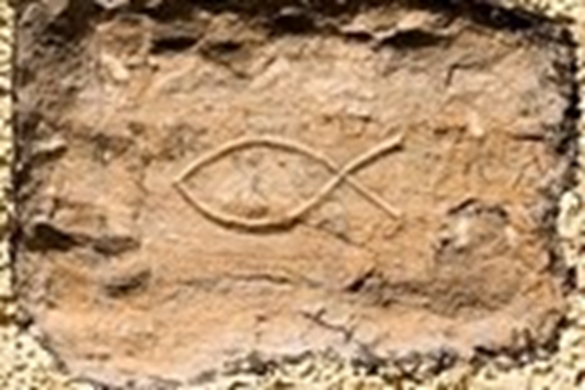
To listen to today’s reflection as a podcast, click here
During the first two centuries after the birth of Jesus, the P.R. department of the Roman Empire was continually cranking out press releases.
There was good news! The term they actually used was the Greek word euangelion, or “gospel.”
The Gospel according to Rome is that God was alive and well on planet earth. The Lord of All had appeared in human form. He was merciful. And just. And He would provide for all the people.
His name was Caesar.
That’s the world into which Christianity was born.
As Rome struggled to hold together its ethnically, religiously, and geographically diverse empire, it became clear to the succession of totalitarian leaders who claimed the title “Caesar” that they would need something – one central reality – that everybody could affirm. The answer they came up with is that they themselves were divine – the very presence of God on earth.
Once a year, residents of Roman-occupied lands participated in a simple ritual to demonstrate their fidelity to the Empire.
In the presence of a local magistrate, citizens and slaves alike were to take a pinch of incense, sprinkle it into an open flame, and speak just two words: Kaisar Kurios. “Caesar is Lord.”
Those two words are Greek, by the way. Why wouldn’t the Romans insist that this ceremony be performed in Latin, their native tongue? The Romans, famously, were pragmatists. For centuries, Greek culture, Greek ideas, and the Greek language held sway in the Mediterranean world. The Romans, recognizing a good thing when they saw it, utilized All Things Greek as a unifying influence.
They even “borrowed” the Greek gods and made them their own, sometimes doing little more than changing names. Thus Zeus became Jupiter, Aphrodite became Venus, Hermes became Mercury, and so forth.
The Ceasar-is-Lord ceremony was crisp and clean, no caffeine, as the old Seven-Up ads used to say. Just sprinkle the incense, speak the words, and walk away. That’s how you checked the box that you were one of the good guys.
But followers of Jesus, in droves, refused to do so.
The only thing they could affirm with their hearts and their heads were two other Greek words: Christos Kurios. “Christ is Lord.”
By and large, Roman magistrates found this behavior baffling. What was the big deal? Just say that Caesar is Lord. You don’t even have to believe it. Let’s put it this way: You don’t want the Empire as your enemy.
Christians did not make things easy for themselves.
They pointed out that the very term that Caesar’s press secretary used – euangelion, or “gospel” (which is the origin of the word “evangelism”) – had been on the lips of Jesus and his biographers. The good news they believed is that the Lord of All really had appeared on earth. But it had happened in Bethlehem, not Rome.
In certain parts of the Empire, for certain periods of time, professing trust in Jesus became a death sentence. If you won’t comply, then you must die.
At some point, Christians began to use a code. If you met a stranger in the street and wondered about his spiritual convictions, you might draw a single line – an arc, actually. The stranger might respond by silently drawing another arc, one that connected with the first line to form the rough outline of a fish.
This ichthus (the Greek word for “fish”) was a bit like a fraternity handshake. Are we in fact brothers or sisters secretly committed to the same world-changing mission?
Ichthus was more than just a secret symbol. It was also a theological statement. Just as the word FISH in English can be an acrostic (for instance, FISH might stand for Fellowship in Somebody’s House), “IXTHYS” communicated five things about Jesus of Nazareth:
I (the Greek letter iota) stands for Iesous, or “Jesus” – that’s actually the Hebrew name “Joshua,” which means “God saves.”
X (the Greek letter chi) represents Christos, or “Christ” – that means, in Jewish tradition, the one who has been anointed by God as Messiah.
Θ (the Greek letter theta) is the first letter of Theou, which means “God’s” (the possessive form of theos, where we get the word “theology”).
Υ (the Greek letter upsilon) starts the Greek word Yios, which means “Son.”
Σ (the Greek letter sigma) is the first letter of Soter – that’s the Greek word for “savior.”
FISH therefore, in the minds of many ancient world Christians, came to mean: “Jesus Christ, God’s Son, Savior.”
That brings us to the contemporary practice of placing an Ichthus symbol on the back of one’s car. Darwinists have satirically countered with a fish symbol of their own – one that is evolving legs. Certain Christians, not to be outdone, have responded with the word “Truth” devouring the Darwinist missing link – and on and on. Call it a mild form of theological road rage.
Contemporary Christians might be fighting the battle of magnetized plastic symbols, but Christians in the waning days of the Roman Empire were literally “fighting” for their lives.
In his epic volume Christ and Caesar, historian Will Durant (whom, we might note, was not a person of faith) came to this conclusion:
“There is no greater drama in human record than the sight of a few Christians, scorned and oppressed by a succession of emperors, bearing all trials with a fierce tenacity, multiplying quietly, building order while their enemies generated chaos, fighting the sword with the word, brutality with hope, and at last defeating the strongest state that history has known.
“Caesar and Christ had met in the arena, and Christ had won.”
A secret code had been part of their shared life.
For us – at least in this part of the world – one of the best aspects of the Good News is that we no longer need to be secret about the Lord we love.
